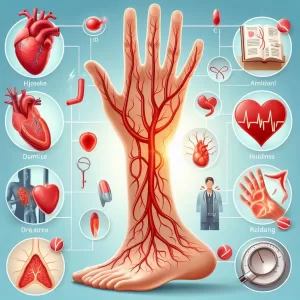What is Myocarditis?
The definition of myocarditis is inflammation of the heart muscle, the myocardium. Myocarditis can reduce the ability of the heart to pump, affecting circulation, and in severe cases it may lead to heart failure and other serious complications.
The most common cause of myocarditis is a viral infection. Other causes of myocarditis may include:[1][2][3]
- Bacteria, such as Corynebacterium diphtheriae, the bacteria that causes diphtheria. Myocarditis caused by bacteria is called bacterial myocarditis
- Parasites, such as Trypanosoma cruzi, the organism that causes Chagas’ disease
- Autoimmune conditions, such as type 1 diabetes and systemic lupus erythematosus
- Certain medications
- Drug abuse
- Excessive alcohol consumption
- Chemotherapy[4]
- Radiation therapy
Myocarditis can affect anyone of any age, but it most commonly occurs in otherwise healthy young adults.[1][2] It is slightly more prevalent in men than women.[5] In 2013, there were 1.5 million reported cases of myocardial inflammation around the world, or approximately 22 instances for every 100,000 people.[6]
Myocarditis may be mild, causing few or no symptoms, or severe, causing life-threatening heart failure. Where present, myocarditis symptoms may include:[1][2][7]
- Fatigue
- Dip in performance during physical activity, such as exercise
- Chest pain
- Rapid heartbeat
- Shortness of breath
- Palpitations
- Swelling of the legs
- Fever
Many cases of acute viral myocarditis clear up on their own within a few days or weeks, leaving no negative health effects. Treatment typically involves bed rest and avoiding physical exercise for several months.
Other types of myocarditis may require treatment with antibiotics or steroids. In some cases, the condition may persist or recur and can cause serious complications. Treatment with heart medications, a pacemaker and surgery may sometimes be necessary.[1]
If you think that you might have a health condition, Please check with your doctor Find my Doctor to find out more about your symptoms.
Symptoms of Myocarditis
The symptoms of myocarditis vary widely and some people do not present with any heart-related symptoms at all. In these cases, myocardial inflammation may be detected when an ECG (electrocardiogram) test shows abnormalities.
The main symptoms of myocarditis in adults may include:[1][2][3]
- Fatigue: More than half of those affected complain of this symptom and a dip in performance during physical activity
- Chest pain or pressure: Over one third of people complain of this symptom
- Fever
- Shortness of breath
- Palpitations
- Rapid heartbeat
- Irregular heartbeat (cardiac arrhythmia)
The affected person may also present with lightheadedness, fainting and swelling of the legs. The symptoms depend on the cause of the inflammation, as well as its severity.
If you think that you might have a health condition, Please check with your doctor Find my Doctor to find out more about your symptoms.
If any symptoms are present and myocarditis is suspected, medical advice should be sought immediately. In some cases, myocarditis can cause serious complications, including heart failure, stroke and sudden death.
Causes
Viruses are the most common cause of myocarditis. The Coxsackie virus is one of the most frequently implicated in viral myocarditis in Western Europe and North America,[6] but many other viruses can trigger myocarditis, including:[1][2][3]
- Parvovirus B-19 (fifth disease)
- Adenovirus (common cold)
- Influenza virus
- Human herpes virus 6 (roseola)
- Epstein-Barr (glandular fever) virus
- Rubella (German measles)
- Varicella (chicken pox)
- Mumps
- Measles
- Enteroviruses
- Hepatitis A and C
- HIV
Myocarditis may develop while the viral infection is present or shortly afterwards.
Bacterial infection, most commonly diphtheria, may also cause myocarditis.[3] In addition, Lyme disease, Chagas’ disease caused by infection with the protozoan organism Trypanosoma cruzi via insect bites in tropical countries,[1] and various other parasites, bacteria and fungi can cause myocarditis.
Other myocarditis causes include:[1][3]
- Allergic reactions to medications
- Heavy metal poisoning, such as lead or iron
- Exposure to other poisons
- Exposure to radiation
- Excess alcohol
- Electric shock
- Rejection of the heart following a heart transplant
- Illicit drug use, such as amphetamines and cocaine
Though rare, myocarditis may also result as a complication of some autoimmune conditions, such as type 1 diabetes and systemic lupus erythematosus, as well as severe hyperthyroidism that leads to thyroid storm.[8]
Giant cell myocarditis
Very rarely, a condition called idiopathic giant cell myocarditis may occur. It is typically seen in otherwise young adults who are otherwise in good health, though it may be associated with inflammatory bowel disease.
In giant cell myocarditis, which is often fatal,[9] abnormal cells develop in the heart muscle. Treatment for giant cell myocarditis typically involves medication to suppress the immune system. In some cases, a heart transplant may be necessary.[10]
Myocarditis Diagnosis
After taking the medical history of the affected person and performing a physical examination, a doctor will typically request an ECG, sometimes called an EKG, to assess the functioning of the heart muscle (myocardium).
They may also order blood tests to look for:[1][2][11][12][13]
- Infections
- Underlying health conditions, such as type 1 diabetes or systemic lupus erythematosus
- Markers of inflammation
- Markers of damage to the heart muscle, such as cardiac troponin – a type of protein that may be found at elevated levels in myocarditis
Other tests that may be carried out include:[1][2][3][11]
- Chest X-ray to check the size and shape of the heart and whether there is any fluid buildup; pulmonary edema is a sign of heart failure
- Heart ultrasound scan (echocardiogram)
- Heart MRI to assess tissue damage
Occasionally, an endomyocardial biopsy may be performed. This entails removing a small tissue sample from the heart and testing it to determine the cause(s) of the myocarditis.[1][3][11]
Endomyocardial biopsy and cardiac MRI are the preferred diagnostic tests for distinguishing myocarditis from other conditions that affect the heart.[14]
If you think that you might have a health condition, Please check with your doctor Find my Doctor to find out more about your symptoms.
Treatment of Myocarditis
In many cases, myocarditis can be treated. The treatment recommended depends on the cause and the severity of the symptoms. During treatment, tobacco and alcohol should be avoided.
Bed rest
People who have been diagnosed with myocarditis should rest and avoid physical exertion, including exercise, for several months to avoid straining the heart muscle. Myocarditis recovery times vary, and a medical practitioner will be able to advise when exercise can be resumed safely.
Medication
Painkillers and anti-inflammatory medication may be prescribed for the management of fever, chest pain and discomfort. If the symptoms of myocarditis are mild, no other treatment, besides bed rest, may be needed.[1][3][15]
Treating underlying causes
Where possible, the underlying cause of the myocarditis should be addressed. Antibiotics may be prescribed to treat a bacterial infection, while steroids may be needed to treat giant cell myocarditis.[1] If an autoimmune condition such as systemic lupus erythematosus is implicated, this should be treated.[11]
Hospital treatment
Where myocarditis symptoms are severe, hospitalization may be necessary. People presenting with heart failure and cardiac arrhythmias may require urgent treatment with the following:[15]
- Oxygen
- Diuretics, vasodilators and other medication to treat heart failure
- Anticoagulants to prevent blood clots
- Medication or, in some cases, a pacemaker to treat arrhythmia
- A defibrillator[2]
Some of these treatments may need to be continued to support the heart and blood pressure until the myocardium recovers.
Complications
In many cases, the prognosis is good, and myocarditis clears up on its own, without any complications or long-term health effects. However, sometimes the heart sustains damage, leaving a degree of heart failure that requires lifelong management.[1] This may involve lifestyle changes and chronic medication.[11] In cases where the damage to the heart muscle is severe, a heart transplant may be necessary.[1]
Myocarditis can be fatal. Death may occur if the condition worsens after diagnosis and becomes unresponsive to treatment. It may also occur suddenly where acute myocarditis has a rapid onset.[1]
Myocarditis and dilated cardiomyopathy
A possible complication of myocarditis, dilated cardiomyopathy is a condition where the heart becomes chronically enlarged and cannot pump blood efficiently.[2] The myocardium dilates, stretching and becoming thinner. As a result, the heart weakens and heart failure may occur. Dilated cardiomyopathy may also cause arrhythmias, blood clots and heart valve problems.[16]
The risk of developing dilated cardiomyopathy from myocarditis, or in general, is low. It is estimated that, overall, two in 10,000 people develop this condition, with myocarditis only one possible cause. Dilated cardiomyopathy typically affects adults between 20 and 60 years of age, and it is more common in males. A genetic predisposition may be present.[17]
Symptoms of dilated cardiomyopathy range from none to possibly including the following:[17]
- Heart failure
- Stroke
- Arrhythmias
- Sudden cardiac death.
To diagnose dilated cardiomyopathy, among other tests, doctors may use:
- Chest X-rays
- ECG tests
- Echocardiograms
Treatment is the same as for heart failure and may involve:[17]
- Diuretics (water pills)
- Beta-blockers (blood pressure medication)
- Anticoagulants (blood thinners)
- Pacemakers
- Defibrillators
In cases where dilated cardiomyopathy does not respond to treatment, a heart transplant may be required.
Good to know: Cardiomyopathy is the medical term for muscular dysfunction of the heart, which can lead to electrical and/or mechanical problems. There are several different types of cardiomyopathy. Cardiomyopathy and myocarditis are not the same thing. However, cardiomyopathy can result from myocarditis. Though confusing, myocarditis is also sometimes known as inflammatory cardiomyopathy.[18][19]
Chronic myocarditis
In a small number of cases, myocarditis may persist and become chronic or long lasting. Chronic myocarditis is associated with dilated cardiomyopathy and may lead to heart failure and other serious complications. Treatment may involve long-term use of steroid medication or a heart transplant operation.[13]
Other complications
Myocarditis can also lead to other complications, including atrial fibrillation, an irregular heartbeat that can cause serious problems, and blood clots that may result in a stroke.
Prevention
While it is difficult to prevent myocarditis, taking steps to prevent the spread of viral, bacterial and other types of infections may help to reduce the risk.
Measures to prevent myocarditis include:[20]
- Staying home when ill and avoiding exercise and other physical exertion
- Washing hands regularly
- Taking precautions when traveling
Diphtheria immunization may prevent diphtheria-related myocarditis.[15] Avoiding the use of illicit drugs, excessive use of alcohol and exposure to poisonous substances may also lower the risk of developing myocarditis.
FAQs
u003cstrongu003eMyocarditis vs. pericarditis – what is the difference?u003c/strongu003e
Myocarditis is an inflammation of the myocardium or heart muscle. Pericarditis, on the other hand, is an inflammation of the pericardium – two thin layers of sac-like tissue that surround the heart. Myocarditis and pericarditis are two separate heart conditions.u003csupu003eu003ca href=u0022https://adoctor.org/wp-admin/post.php?post=4904u0026amp;action=edit#fn21u0022u003e[21]u003c/au003eu003c/supu003eu003cbru003eu003cbru003eu003ca href=u0022https://adoctor.org/conditions/pericarditis/u0022u003eRead more about Pericarditis »u003c/au003e
u003cstrongu003eMyocarditis vs. endocarditis – what is the difference?u003c/strongu003e
Myocarditis is the name for inflammation of the heart muscle, which is called the myocardium. Endocarditis on the other hand refers to a rare infection of the inner lining of the heart, which is called the endocardium, as well as the heart valves. Myocarditis and endocarditis are two distinct heart conditions.u003cbru003eu003cbru003eu003ca href=u0022https://adoctor.org/conditions/endocarditis/u0022u003eRead more about Endocarditis »u003c/au003e
u003cstrongu003eCan myocarditis come back?u003c/strongu003e
Yes, myocarditis can recur. If myocarditis recurs, this can sometimes lead to dilated cardiomyopathy. Recurrence is not very common; it is estimated to occur in 10-15 percent of people who have experienced myocarditis.u003csupu003eu003ca href=u0022https://adoctor.org/wp-admin/post.php?post=4904u0026amp;action=edit#fn2u0022u003e[2]u003c/au003eu003ca href=u0022https://adoctor.org/wp-admin/post.php?post=4904u0026amp;action=edit#fn22u0022u003e[22]u003c/au003eu003c/supu003e
u003cstrongu003eCan myocarditis cause a heart attack or heart failure?u003c/strongu003e
In severe cases, myocarditis can lead to u003ca href=u0022https://adoctor.org/conditions/chronic-heart-failure/u0022u003eheart failureu003c/au003e or u003ca href=u0022https://adoctor.org/conditions/ischemic-stroke/u0022u003estrokeu003c/au003e, though it is unlikely to lead to a u003ca href=u0022https://adoctor.org/conditions/myocardial-infarction/u0022u003eheart attacku003c/au003e. Myocarditis can cause the heart muscle to become damaged and weak, rendering it unable to pump blood around the body properly. This can lead to heart failure. A clot may form in the weakened heart, possibly leading to a stroke.u003csupu003eu003ca href=u0022https://adoctor.org/wp-admin/post.php?post=4904u0026amp;action=edit#fn20u0022u003e[20]u003c/au003eu003c/supu003e u003cstrongu003eIf myocarditis is suspected, it is very important to consult a doctor without delay.u003c/strongu003e
u003cstrongu003eCan children get myocarditis?u003c/strongu003e
Yes, children and infants can get myocarditis. However, pediatric myocarditis is uncommon. Myocarditis in children is typically acute or fulminant (severe and rapid in onset) and maybe a cause of sudden death. The most common cause of myocarditis in children is a viral infection.u003csupu003eu003ca href=u0022https://adoctor.org/wp-admin/post.php?post=4904u0026amp;action=edit#fn23u0022u003e[23]u003c/au003eu003c/supu003e
Other names for myocarditis
- Myocardial inflammation
- Heart muscle inflammation
- Inflammatory cardiomyopathy
-
Patient. “Myocarditis.” January 24, 2017. Accessed August 17, 2017. ↩ ↩ ↩ ↩ ↩ ↩ ↩ ↩ ↩ ↩ ↩ ↩ ↩ ↩ ↩ ↩
-
Myocarditis Foundation. “About Myocarditis.” Accessed August 17, 2017. ↩ ↩ ↩ ↩ ↩ ↩ ↩ ↩ ↩ ↩
-
Patient. “Myocarditis.” January 24, 2017. Accessed August 18, 2017. ↩ ↩ ↩ ↩ ↩ ↩ ↩ ↩
-
Journal of Clinical Medicine Research. “Chemotherapy Induced Cardiomyopathy: Pathogenesis, Monitoring and Management.” March 24, 2009. Accessed February 20, 2018. ↩
-
Current Problems in Cardiology. “Sex and Gender Differences in Myocarditis and Dilated Cardiomyopathy.” January, 2013. Accessed August 17, 2017. ↩
-
UpToDate. “Etiology and pathogenesis of myocarditis.” July 28, 2017. Accessed August 17, 2017. ↩ ↩
-
WebMD. “What You Should Know: Myocarditis.” Accessed December 12, 2018. ↩
-
Internal Medicine. “Thyroid storm and lymphocytic myocarditis.” March 15, 2010. Accessed July 19, 2018. ↩
-
The New England Journal of Medicine. Idiopathic Giant-Cell Myocarditis – Natural History and Treatment.” June 26, 1997. Accessed August 21, 2017. ↩
-
Circulation: Heart Failure. “Diagnosis, Treatment, and Outcome of Giant-Cell Myocarditis in the Era of Combined Immunosuppression.” January 15, 2013. Accessed July 18, 2018. ↩
-
Texas Heart Institute. “Myocarditis.” August, 2016. Accessed August 21, 2017. ↩ ↩ ↩ ↩ ↩
-
MedlinePlus. “Troponin test.” July 9, 2018. Accessed July 18, 2018. ↩
-
Myocarditis Foundation. “Chronic Myocarditis.” Accessed July 18, 2018. ↩ ↩
-
National Center for Biotechnology Information. “Myocarditis in the differential diagnosis of cardiomyopathies. Endomyocardial biopsy or MRI?” June, 2015. Accessed August 22, 2017. ↩
-
Harvard Health Publications. “Myocarditis.” May, 2015. Accessed December 12, 2018. ↩ ↩ ↩
-
American Heart Association. “Dilated Cardiomyopathy (DCM).” February 20, 2017. Accessed August 23, 2017. ↩
-
Patient. “Dilated Cardiomyopathies.” June 16, 2014. Accessed August 23, 2017. ↩ ↩ ↩
-
British Heart Foundation. “Cardiomyopathy.” Accessed July 18, 2018. ↩
-
Current Opinion in Cardiology. “Myocarditis and cardiomyopathy.” May, 2018. Accessed July, 2018. ↩
-
Mayo Clinic. “Myocarditis.” July 12, 2017. Accessed July 18, 2018. ↩ ↩
-
American Heart Association. “What is Pericarditis?” July 5, 2016. Accessed August 23, 2017. ↩
-
European Journal of Internal Medicine. “Rate and patient features associated with recurrence of acute myocarditis.” December, 2014. Accessed July 19, 2018. ↩
-
UpToDate. “Clinical manifestations and diagnosis of myocarditis in children.” November 23, 2015. Accessed August 23, 2017. ↩
**What is Myocarditis?**
Myocarditis is a rare but serious condition that involves inflammation of the heart muscle (myocardium). [[1]] This inflammation can weaken the heart and its electrical system. [[1]] As a result, the heart’s ability to pump blood declines. [[1]]
**Causes**
– Viral infections, such as the flu, mumps, or coxsackievirus [[2]]
– Bacterial infections, such as tuberculosis or Lyme disease [[4]]
– Fungal infections, such as histoplasmosis or coccidioidomycosis [[4]]
– Parasites, such as toxoplasmosis or Chagas disease [[4]]
– Certain medications, such as antibiotics, chemotherapy drugs, or anti-inflammatory drugs [[2]]
- Autoimmune disorders, such as lupus or rheumatoid arthritis [[4]]
– Radiation therapy [[4]]
**Symptoms**
Myocarditis can cause a range of symptoms, depending on the severity of the inflammation. [[2]] Some common symptoms include:
– Chest pain [[2]]
– Shortness of breath [[2]]
– Fatigue [[2]]
– Palpitations [[2]]
– Lightheadedness or dizziness [[2]]
– Leg swelling [[2]]
**Diagnosis**
Myocarditis can be difficult to diagnose because its symptoms can resemble those of other heart conditions. [[1]] A doctor will typically perform a physical exam and ask about your symptoms and medical history. [[1]] They may also order tests such as:
– Blood tests to check for infection or inflammation [[1]]
– Chest X-ray to look for enlargement of the heart [[1]]
– Electrocardiogram (ECG) to record the heart’s electrical activity [[1]]
– Echocardiogram to create images of the heart and assess its function [[1]]
– Endomyocardial biopsy to take a small sample of heart tissue for examination under a microscope [[1]]
**Treatment**
There is no cure for myocarditis, but treatment can help to reduce inflammation and improve heart function. [[1]] Treatment may include:
– Medications to reduce inflammation, such as corticosteroids or nonsteroidal anti-inflammatory drugs (NSAIDs) [[1]]
– Medications to improve heart function, such as diuretics or ACE inhibitors [[1]]
– Bed rest to reduce the strain on the heart [[1]]
– In severe cases, a heart transplant may be necessary [[1]]
**Prognosis**
The prognosis for myocarditis varies depending on the severity of the inflammation. [[1]] Some people may recover completely, while others may develop long-term heart damage. [[1]]
One comment
Leave a Reply
Popular Articles








Myocarditis is inflammation of the heart muscle. It can be caused by viruses, bacteria, fungi, or parasites. Symptoms can include chest pain, shortness of breath, fatigue, and palpitations. Treatment depends on the underlying cause.